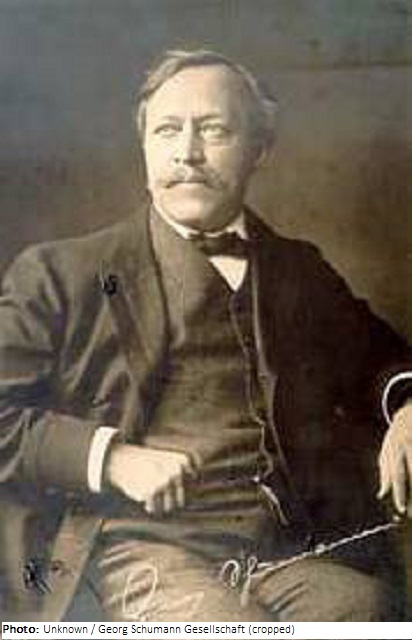
| Roles | Referee |
|---|---|
| Sex | Male |
| Full name | Alfred Georg•Schumann |
| Used name | Georg•Schumann |
| Born | 25 October 1866 in Königstein, Sachsen (GER) |
| Died | 23 May 1952 (aged 85 years 6 months 29 days) in West-Berlin, Berlin (GER) |
| NOC |  Germany Germany |
The conductor and composer Georg Schumann was a brother of the composer and organist Camillo Schumann (1872-1946). Georg studied with his father, the municipal music director, and with his grandfather, a cantor, and then attended courses in Dresden and studied at the Leipzig Conservatory in 1882-88. He directed a vocal society in Danzig (1890-96) and the Bremen Philharmonic (1896-99).
In 1900, Schumann settled in Berlin, where he became conductor of the Singakademie, a position he held until 1952. In 1907 he became a member of the Prussian Academy of Arts, where he taught a master class in composition from 1913 to 1945. In 1934 he was elected the last president of the Academy. From these positions Georg Schumann had a decisive influence on German and especially Berlin musical life.
Schumann’s music can be assigned to the outgoing late Romantic and New Romantic periods. He wrote over 100 compositions, mainly choral works, e.g. oratorios, chamber music and orchestral works, including the prize-winning h-minor symphony in 1887. He also wrote most of the arrangements for the so-called “Kaiserliederbuch” (Emperor’s Song Book), an extensive collection of more than 600 folk songs in older and newer textures.
Schumann was appointed Royal Professor at the Friedrich-Wilhelms University of Berlin in 1901 and an honorary doctor of the Faculty of Philosophy of the same university in 1916. He received the Beethoven Prize in 1933, the Goethe Medal for Art and Science in 1934, and the honorary membership of the Beethoven House in Bonn in 1935. In 1935, Schumann was also among the 150 personalities in cultural life whom Nazi Propaganda Minister Joseph Goebbels appointed “Reich Cultural Senator”. After the war, Schumann received the title of Honorary Director of the Berlin Sing-Akademie in 1950 and, in 1951, the Grand Cross of Merit of the Federal Republic of Germany.
| Games | Sport (Discipline) / Event | NOC / Team | Phase | Unit | Role | As | |
|---|---|---|---|---|---|---|---|
| 1936 Summer Olympics | Art Competitions |  GER GER |
Georg Schumann | ||||
| Music, Compositions For Orchestra, Open (Olympic) | Final Standings | Judge | |||||
| Music, Compositions For Solo Or Chorus, Open (Olympic) | Final Standings | Judge | |||||
| Music, Instrumental And Chamber, Open (Olympic) | Final Standings | Judge |